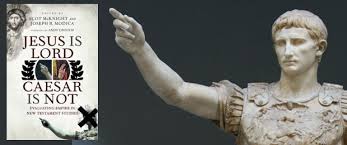The longest and most substantial essay in this volume is that of Michael Bird who analyzes Romans in terms of anti-imperial rhetoric. Point of view in such an analysis matters. For example, it’s one thing for a monotheist to say Jesus is the Son of God, which might well imply no one else truly is. But to a polytheist who overheard such a comment, it would hardly be heard as a directly negative comment on the living Emperor since: 1) they believed in multiple deities; 2) they believed multiple Emperors could claim to be a son of the gods and any way living ones didn’t tend to encourage such claims; and 3) there were other divine and quasi divine figures like Herakles/Hercules who could claim such a title as well; and finally 4) in the ANE and in the far eastern part of the empire numerous kings claimed all sorts of throne names, including being God’s son.
In the eastern part of the Empire there was a tendency to use the language of deity for rulers far more readily than in the Western part of the Empire. One good example is P. Oxy. 1021 which dates to the accession of Nero to the throne, and comes from Alexandria. In this rescript Nero is called “the good ‘daimonon’ of the inhabited world, and the beginning of all (sorts of) good things”. A. Deissmann long ago analyzed this imperial rescript and sees it as something the governor of Egypt drew up as an adaptation of this fact to the Alexandrian cult. It was in any case an attempt at curing favor, and sucking up to the new ruler. We should notice as well that the term theos was not used here. When Paul uses the term daimon he of course means something rather different in 1 Cor. 10. In any case, Alexandria was a very different and more Oriental context than Rome when it came to the using of divine titles.
On p. 159 Bird argues about Rom. 13: “Paul acquiesces to political submission for the sake of respecting God’s appointed servants who genuinely benefit the city, and he recognizes that respect for the authorities is a sensible way of staying under the radar of the imperial security apparatus. However he is certain that Rome is not Roma aeterna…because ‘the time is short’ (1 Cor. 7.29) ‘the day is near’ (Rom.13.12) and all will stand before the judgment seat of God (Rom. 14.10).” The first part of this sentence is right, the last part mostly wrong. Paul does not say the time is short. The Greek is clear enough… he says it has been shortened (by the past eschatological event of Christ’s res.). Paul was not a person convinced that Christ was definitely coming back next week. He does not give an interim ethic only suitable for a short interim before God judges Rome. If that was what he was doing he was wrong on both scores. Jesus did not come back soon, and historically speaking the Roman Empire did not expire due to the return of Christ. I would add Paul does more than acquiesce to the governing authorities. He says they have power and authority from the God of the Bible! And he is talking about Nero and other such authorities no less, but the reference to Nero would be certainly understood in a letter written to Rome itself.
Was Paul engaging in a hidden transcript of protest against Rome and its authorities? If all one means by this is that Paul would oppose idolatry and the abuse of legitimate power in any form, then Paul would have agreed, although that’s not his real interest or focus in writing Romans. There is however nothing hidden about what Paul says about Christ in Rom. 1 or elsewhere in this document and Paul did not lack the courage of his convictions. Anyone who publicly ran around proclaiming a crucified Jewish manual worker had been risen from the dead and was declared to be Son of the Biblical God in power and ‘our Lord’ didn’t lack courage or chutzpah. He didn’t need hidden transcripts, even when he wrote to a congregation in Rome that he did not convert. Rom. 13 could hardly be called either politically malicious or seditious contra Bird on p. 162. Indeed, many if not most have seen it as sending just the opposite message of governmental legitimacy in the form of a limited endorsement so long as there was no abuse of power, and no idolatry involved.
The only way that a clear implicit critique of the imperial cult could be heard in statement about Jesus in such a context is if that imperial cult was so pervasive, and so popular among the common people in society that it was regularly on their minds, and they had one near by. But clearly enough Rome itself was precisely the epi-center of such a cult, so a letter to the Romans at the very least would meet the context or provenance test for an resonance to be heard in Romans.
Bird begins with a fair and balanced assessment of the pros and cons of seeing Romans as anti-Roman, or at least anti-imperial cult. There are some flies in the ointment even here though, flies that we find in Tom Wrights argument as well. First of all, it is not logical in light of Rom. 13.1-7 to suggest that Paul thought that the Emperor was inherently one of the evils or demonic powers that Paul elsewhere tells us Christ conquered through his death (see e.g. Colossians 1-2). Either as Paul says in Rom. 13 the current governing authorities have their authority from God ultimately, and therefore are legitimate authorities who have the right to maintain justice, peace, order, and collect taxes to funds such operations….. or Paul is equivocating in that passage. The attempt to mush together human rulers, and in particular the Emperor with supernatural principalities and powers simply doesn’t work. It doesn’t work not only because the ancients believed in real demons and angels. It doesn’t work because of what is said in texts like Rom. 13 and the parallel in 1 Pet. Obviously, if a legitimate authority goes beyond its brief and claims to be a deity, then this is a violation of what the Bible says about idolatry, just as the persecution of Christians would be an abuse of power. But here’s the deal— How many living Emperors, besides crazy Caligula, insisted on being worshipped— while they were alive. Seneca ridicules Claudius for such pretensions and ideas, and he was the adviser to Nero during the five good initial years of his reign. Romans was written precisely during that period, before either Nero insisted that deity suited him while alive and before Seneca gave up on Nero, and before the fire in A.D. 64 when Christians began to be scape-goated. I am not concerned here with what Nero allowed in the last two years of his scandalous reign. But it should be pointed out that even then, as late as after the fire, he opposed the building of a temple to himself as a god, because it was his belief that only dead emperors could achieve deity. This was in line with the fact that the imperial cult grew out of the practice of the worship of ones ancestors.
If one wants to check on this, I suggest Miriam Griffin’s standard bio of Nero entitled Nero. The End of a Dynasty (Yale 1984). When Paul wrote Romans, as the classics scholars say, Nero was still in his Golden Years under the tutelage of Seneca and under the control of Burrus of the Praetorian Guard. Not only was he not wanting a temple built to honor him as a god, he had also promised at his accession, and kept this promise for many years not to have sedition trials of those elites who may have disagreed with him. In other words, the Gentiles in Rome would not have heard the claim ‘Jesus is the son of God’ as a counter claim to anything the living Emperor Nero was saying about himself. Notably lacking in Griffin’s treatment of Nero is a discussion of the imperial cult as an important feature of Nero’s reign before the fire in 64. Apparently, it wasn’t before Seneca committed suicide and other bad things happened.
Now for the anti-imperial rhetoric to be read into Romans, one actually has to argue that the kingdom of Jesus is currently an attack on or inherently subversive of the kingdom of Caesar, and that in fact it is in the process of replacing that kingdom, especially because ‘Jesus is necessarily coming back soon and finishing off the Roman Empire’.
Rom. 1.3-4 is an important text in the discussion and states that Jesus has been declared to be or vindicated to be Son of God in power by means of resurrection, and also ‘our’ Lord. Notice the word ‘our’. One needs to ask the question— does this mean ‘as opposed to ‘theirs’?? Or does it simply denote the sphere on earth in which Jesus is particularly Lord, namely over his own people? The term Lord implies a relationship with some subjects, just as Son of God implies a relationship with God the Father. These terms are not generic in character— Jesus is not the Son of just any God, nor is he the Lord of just any people. He is the Lord of Jews and Gentiles who are ‘in Christ’. This is not to deny the general sovereignty of God over all kingdoms, but the point is the reign of Christ in his people has not yet, and is not really in the process of, displacing the existing kingdoms, which God empowered to exist in the first place.












